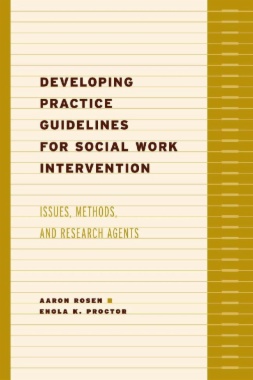This book bridges the gap between social work knowledge and empirically based practice. Although there is a significant need for the use of empirically tested and verified knowledge in social work practice, the empirical basis of support is nearly absent from practitioners'considerations as they make clinical decisions in routine practice. The authors advocate the development of readily available, accessible, and professionally sanctioned practice guidelines for use by practitioners, a necessity in the age of managed care and demands for greater accountability, effectiveness, and efficiency in practice. This book features a much-needed discussion of racial and ethnic differentials in relation to practice guidelines and on the relationship between practice guidelines and different aspects of service delivery.
- Table of Contents
- Preface
- 1. Practice Guidelines and the Challenge of Effective Practice
- PART I:
Precursors of Guidelines: Intervention Research
and Evidence-Based Practice
- 2. Intervention Research in Social Work: A Basis for Evidence-Based
Practice and Practice Guidelines
- 3. Evidence-Based Practice: Implications for Knowledge Development and
Use in Social Work
- 4. Empirical Foundations for Practice Guidelines in Current Social Work
Knowledge
- PART II:
Practice Guidelines for Social Work: Need, Nature,
and Challenges
- 5. Clinical Guidelines and Evidence-Based Practice in Medicine,
Psychology, and Allied Professions
- 6. The Structure and Function of Social Work Practice Guidelines
- 7. Social Work Should Help Develop Interdisciplinary Evidence-Based
Practice Guidelines, Not Discipline-Specific Ones
- 8. The Role of Diagnostic and Problem Classification in Formulating
Target-Based Practice Guidelines
- 9. Constructing Practice: Diagnoses, Problems, Targets, or Transactions?
- PART III:
Responsiveness of Practice Guidelines to Diversity in
Client Populations and Practice Settings: The Idiographic Application
of Normative Generalizations
- 10. Accounting for Variability in Client, Population, and Setting
Characteristics: Moderators of Intervention Effectiveness
- 11. Service-Delivery Factors in the Development of Practice Guidelines
- 12. Performance Standards and Quality Control:
Application of Practice Guidelines to Service Delivery
- PART IV:
Practitioner, Organizational, and Institutional Factors
in the Utilization of Practice Guidelines
- 13. Practitioner Adoption and Implementation of Practice Guidelines and
Issues of Quality Control
- 14. Organizational and Institutional Factors in the Development of Practice
Knowledge and Practice Guidelines in Social Work
- 15. Social Work Practice Guidelines in an Interprofessional World:
Honoring New Ties That Bind
- PART V: Conclusion
- 16. Advancing the Development of Social Work Practice Guidelines:
Directions for Research
- Index

